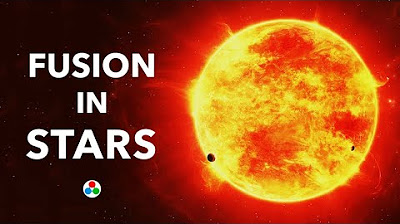How Does Fusion Power the Sun?
Summary
TLDRThe Sun, a colossal sphere of dense hydrogen gas, powers itself through the violent process of nuclear fusion, converting hydrogen into helium at its core. Despite the simplicity of the fusion process, it requires immense heat and pressure to overcome the repulsive force between positively charged protons. The Sun's gravitational force compresses its mass, enabling about 100 million quadrillion collisions every second, with 5 million tons of mass converted into energy continuously. This dynamic process underlines the Sun's dominance, containing 99.8% of all the matter in our solar system.
Takeaways
- 🌞 The Sun is primarily composed of dense hydrogen gas, with layers extending hundreds of thousands of miles deep.
- ⚛️ Nuclear fusion occurs at the Sun's core, where hydrogen atoms fuse to create helium, releasing energy.
- 🔄 The process of fusion is driven by the collision of hydrogen atoms, which is a violent reaction.
- ⚡ Fusing hydrogen into helium requires overcoming the natural repulsion between positively charged protons.
- 🔥 High temperatures and immense pressure, generated by gravitational force, are necessary to facilitate fusion.
- 🌌 The Sun contains 99.8% of all the matter in the solar system, exerting significant gravitational pull.
- 🔋 Each second, approximately 100 million quadrillion hydrogen atoms collide and fuse in the Sun.
- 💥 These fusion reactions release a vast amount of energy, contributing to the Sun's light and heat.
- 🌍 The fusion process converts about 5 million tons of mass into energy every day.
- ✨ The energy produced by the Sun is essential for life on Earth, providing the light and warmth necessary for our survival.
Q & A
What are the main components of the Sun's core?
-The core of the Sun is primarily composed of dense hydrogen gas, with layers extending hundreds of thousands of miles deep.
What nuclear reaction powers the Sun?
-The Sun is powered by nuclear fusion, specifically the fusion of hydrogen atoms into helium.
Why is it difficult for hydrogen atoms to fuse?
-Hydrogen atoms are both positively charged protons, which means they repel each other. To fuse, they need immense energy or velocity to overcome this repulsion.
What role does gravity play in nuclear fusion within the Sun?
-Gravity generates immense heat and pressure that forces protons together, allowing nuclear fusion to occur.
What percentage of the solar system's mass does the Sun contain?
-The Sun contains 99.8% of all the matter in the solar system.
How does the Sun's mass affect its gravitational force?
-The Sun's massive amount of mass creates an unimaginable gravitational force that pulls everything together within the solar system.
How often do hydrogen atoms collide and fuse in the Sun?
-In the Sun, hydrogen atoms collide and fuse approximately 100 million quadrillion quadrillion times each second.
What happens to the mass of protons when they fuse?
-When protons fuse to form helium, they lose a small amount of mass, which is converted into energy.
How much mass is converted into energy every second in the Sun?
-About 5 million tons of mass are converted into energy every second in the Sun.
What is the significance of the energy produced by nuclear fusion in the Sun?
-The energy produced by nuclear fusion in the Sun is essential for providing light and heat to the solar system, sustaining life on Earth.
Outlines

Cette section est réservée aux utilisateurs payants. Améliorez votre compte pour accéder à cette section.
Améliorer maintenantMindmap

Cette section est réservée aux utilisateurs payants. Améliorez votre compte pour accéder à cette section.
Améliorer maintenantKeywords

Cette section est réservée aux utilisateurs payants. Améliorez votre compte pour accéder à cette section.
Améliorer maintenantHighlights

Cette section est réservée aux utilisateurs payants. Améliorez votre compte pour accéder à cette section.
Améliorer maintenantTranscripts

Cette section est réservée aux utilisateurs payants. Améliorez votre compte pour accéder à cette section.
Améliorer maintenantVoir Plus de Vidéos Connexes

The Sun isn't a fireball. #shorts #science #SciShow

How Stars Turn MATTER into ENERGY | Nuclear Fusion

21.4 Nuclear Fission and Fusion

Birth of stars | Stars, black holes and galaxies | Cosmology & Astronomy | Khan Academy

How the Sun Shines: The Nuclear Reactions that Power the Sun

Bersinar milyaran tahun, dari mana asal energi matahari?
5.0 / 5 (0 votes)
